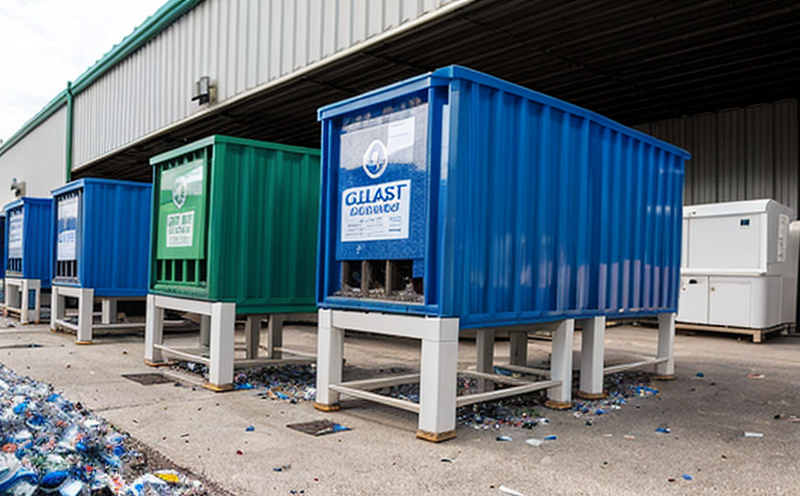EN 12883 Abrasion Resistance of Recycled Glass
The EN 12883 test standard is a critical tool used in waste management and recycling for assessing the abrasion resistance of recycled glass. This test is essential to ensure that recycled glass products can withstand wear and tear, maintaining their integrity over time. Abrasion resistance is crucial for applications such as construction, where recycled glass is often repurposed into new building materials.
The standard provides a standardized method for determining the abrasion resistance of ground or crushed recycled glass by measuring the reduction in weight after a specified test duration. This process simulates real-world conditions under which recycled glass might be used, providing valuable insights into its durability and performance.
Understanding the abrasion resistance of recycled glass is vital for several reasons:
- It ensures that recycled products meet quality standards required by end-users.
- It helps in optimizing the recycling process to enhance product longevity.
- It supports environmental sustainability efforts by promoting the use of recycled materials without compromising on performance.
The test is particularly important for industries that rely heavily on recycled glass, such as construction and manufacturing. By ensuring that recycled glass meets stringent abrasion resistance criteria, these sectors can enhance their sustainable practices while maintaining high-quality product standards.
Our laboratory adheres strictly to the requirements outlined in EN 12883, employing state-of-the-art equipment and experienced technicians to conduct accurate and reliable tests. This ensures that clients receive precise results that are both credible and actionable.
| Aspect | Description |
|---|---|
| Test Specimen | The test specimen consists of ground or crushed recycled glass particles. The size range is typically between 0.5 mm to 2 mm. |
| Testing Instrument | A rotating drum with a fixed abrasive surface simulates real-world abrasion conditions. The drum rotates at a specified speed and angle, allowing for consistent testing. |
| Duration | The test duration is standardized to 10 hours under controlled environmental conditions. |
| Weighing | Before and after the test, the specimen weight is measured accurately. The difference in weight indicates the amount of abrasion experienced by the recycled glass. |
Scope and Methodology
The scope of EN 12883 is to provide a standardized method for assessing the abrasion resistance of ground or crushed recycled glass. This test is particularly useful in waste management and recycling sectors, where ensuring the durability of recycled materials is crucial.
| Aspect | Description |
|---|---|
| Test Specimen | The test specimen consists of ground or crushed recycled glass particles. The size range is typically between 0.5 mm to 2 mm. |
| Testing Instrument | A rotating drum with a fixed abrasive surface simulates real-world abrasion conditions. The drum rotates at a specified speed and angle, allowing for consistent testing. |
| Duration | The test duration is standardized to 10 hours under controlled environmental conditions. |
| Weighing | Before and after the test, the specimen weight is measured accurately. The difference in weight indicates the amount of abrasion experienced by the recycled glass. |
Why Choose This Test
Selecting the EN 12883 test for assessing the abrasion resistance of recycled glass offers several advantages:
- Standardization: The test adheres to international standards, ensuring consistent and reliable results.
- Environmental Impact: By testing recycled materials, we contribute to sustainable practices without sacrificing product quality.
- Cost-Effective: Ensuring durability early in the recycling process can save costs associated with premature failures or replacements.
- Quality Assurance: This test provides critical data that helps manufacturers and end-users make informed decisions about recycled glass products.
The results of this test play a vital role in enhancing the reputation of recycled glass products, ensuring they meet or exceed industry expectations. By investing in this testing process, businesses can position themselves as leaders in sustainability and quality assurance.
Customer Impact and Satisfaction
- Increased Confidence: Clients receive accurate and reliable test results that enhance their confidence in the quality of recycled glass products.
- Better Decision-Making: The data provided by this test helps clients make informed decisions about which recycled materials to use, ensuring optimal performance.
- Competitive Advantage: By offering high-quality recycled glass products, businesses can gain a competitive edge in the market.
- Improved Reputation: Demonstrating commitment to sustainability and quality through this test can significantly boost a company's reputation among eco-conscious consumers.





